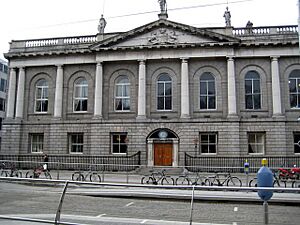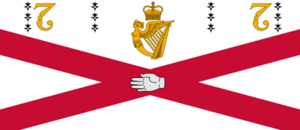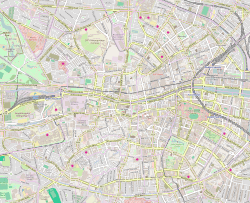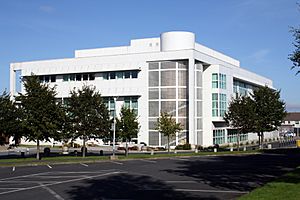Royal College of Surgeons in Ireland facts for kids
|
Coláiste Ríoga na Máinleá in Éirinn
|
|
 |
|
| Motto | Consilio Manuque (Scholarship and Dexterity) |
|---|---|
| Type | Not-for-profit |
| Established | 11 February 1784 |
| President | Professor Deborah McNamara |
| Vice-Chancellor | Professor Cathal Kelly |
| Students | 4,094 (as of 2020) |
| Address |
,
,
D02 YN77
,
53°20′21″N 6°15′45″W / 53.33918°N 6.26257°W |
| Campus | Urban |
| Language | English |
| Affiliations | NUI |
 |
|
The Royal College of Surgeons in Ireland (RCSI) is a special university focused on medicine and health sciences. It is also known as RCSI University of Medicine and Health Sciences. It was started in 1784 to train surgeons in Ireland. Today, it teaches many different health subjects in several countries.
RCSI's main campus is in the center of Dublin, on St. Stephen's Green and York Street. Here, students can study to become doctors, pharmacists, physiotherapists, dentists, and nurses. RCSI offers courses for both new students and those who want to continue their education.
RCSI is recognized as one of the best universities in the world for its work in "Good Health and Well-being." This is based on how it helps improve health for everyone.
Contents
The Story of RCSI: A Look Back in Time
How RCSI Began: From Barbers to Surgeons
For a long time, in the city of Dublin, surgeons were part of a group called the Barber-Surgeons' Guild. This guild was like a club that gave permission to people to practice surgery. To join, you had to train for three years as an apprentice. Then, you worked for two more years as a journeyman. RCSI kept this apprenticeship rule until 1828.
In 1446, the Barber-Surgeons' Guild became an official group thanks to a royal order from King Henry VI. This made it the first medical group of its kind in Britain or Ireland.
In 1765, a surgeon named Sylvester O'Halloran suggested creating a special college just for surgeons. He wanted it to be like a famous college in Paris that trained and guided surgeons. So, in 1780, the Dublin Society of Surgeons was formed.
At that time, Trinity College did not teach surgery. This meant Ireland needed a place focused on surgical training. The Dublin Society of Surgeons worked hard to get a special permission from the King. In 1784, King George III gave them this permission. The first leaders of the new college met for the first time on March 2, 1784.
Fairness for Everyone
From the very beginning, RCSI welcomed everyone. People were not judged based on their religion. Two of the college's founders, Sylvester O'Halloran and William Dease, were Catholic. Many of its early presidents were also Catholic. RCSI also accepted medical degrees from the Catholic University of Ireland, which helped make those degrees official.
RCSI in the 1800s
The first student to take an exam at RCSI was John Birch in August 1784.
RCSI moved to its current main location on York Street in 1805. The first stone of the new building was laid in 1806, and it was finished in 1810. This building is still the main home of RCSI today.
In 1844, Queen Victoria gave RCSI another special permission. This divided medical graduates into two groups: Licentiates and Fellows. At first, doctors and surgeons were trained together. In 1886, these two areas joined, and the medical school officially began. Because of this history, medical graduates still receive special diplomas from RCSI. They also get degrees like Bachelor of Medicine (MB) and Bachelor of Surgery (BCh).
RCSI was also the first medical school in Ireland to allow women to attend classes. This happened in 1885. The first woman to become a Fellow of RCSI was Emily Winifred Dickson in 1893.
RCSI in the 1900s
During the 1916 Rising, which was a big event in Irish history, the main RCSI building was taken over by Irish forces. After the fighting, the leaders were tried.
In 1967, Ethna Gaffney became the first female professor at RCSI. This was an important step forward. RCSI also became the first place in Ireland to offer a special four-year medical program for students who already had a college degree.
RCSI in the 2000s
Between 2014 and 2018, RCSI researchers worked with over 2,100 groups around the world. They published more than 2,900 research papers together. RCSI's research is highly respected globally.
In December 2019, RCSI officially became a university. This was a big achievement, making it the ninth university in Ireland. This change in status was a goal for a long time. It means RCSI can now award its own degrees.
Hospitals Connected to RCSI
Since the 1980s, Beaumont Hospital, Dublin has been the main hospital where RCSI students train. Other hospitals connected to RCSI include Connolly Hospital, Royal Victoria Eye and Ear Hospital, and University Hospital Waterford.
RCSI Around the World
RCSI is involved in medical education in many places around the globe. For example, during a time called Apartheid in South Africa, RCSI helped provide medical education to people who faced unfair treatment. Today, students from more than 95 countries study at RCSI.
RCSI also has a campus in Bahrain, called RCSI-Bahrain. It offers programs for doctors and nurses.
Famous People Who Studied at RCSI
Many important people have studied at RCSI. Here are a few:
- Abraham Colles: A professor who first described a type of wrist injury, now called Colles' fracture.
- Felipe Contepomi: A famous rugby player from Argentina.
- Emily Winifred Dickson: The first woman to become a Fellow of any Royal College of Surgeons in Ireland or Great Britain.
- Sir Ian Fraser: A surgeon who helped bring the use of penicillin to military hospitals during the Second World War.
- Nada Haffadh: Bahrain's first female government minister, serving as Minister of Health.
- Karl Mullen: An Irish rugby player who captained the team that won the Grand Slam in 1948.
- Pat O'Callaghan: An Irish athlete who won gold medals at the 1928 and 1932 Olympic Games.
- Wan Azizah Wan Ismail: The first female Deputy Prime Minister of Malaysia.
- Sir William Wilde: A surgeon and author, and the father of the famous writer Oscar Wilde.
Special Honorary Fellows
RCSI has also given special honorary titles to many important people who did not study there but made big contributions. These include:
- Louis Pasteur: A famous scientist.
- Joseph Lister: A pioneer in sterile surgery.
- Nelson Mandela: A leader who fought for freedom in South Africa.
- Mother Teresa of Calcutta: A Nobel Peace Prize winner known for her charity work.
- Mary Robinson: A former President of Ireland.
- Jimmy Carter: A former President of the United States.
- Mahathir Mohamad: A former Prime Minister of Malaysia.
- Seamus Heaney: A Nobel Prize-winning poet.
- Mary McAleese: A former President of Ireland.
- Bob Geldof: A musician and activist.
Honorary Degrees from RCSI
Since 2010, RCSI has been able to award its own honorary degrees. These are special degrees given to people who have achieved great things. Some people who have received honorary doctorates include:
- Mary McAleese: Former President of Ireland.
- Abraham Verghese: A professor at Stanford University School of Medicine.
- Bennet Omalu: A forensic pathologist who discovered a brain disease in athletes.
- Siddhartha Mukherjee: A well-known author and professor of medicine.
- Sally Davies: A former Chief Medical Officer for England.
- Richard Horton: The editor of The Lancet, a famous medical journal.
- Martin Seligman: A founder of Positive Psychology.
Images for kids
 | Laphonza Butler |
 | Daisy Bates |
 | Elizabeth Piper Ensley |




